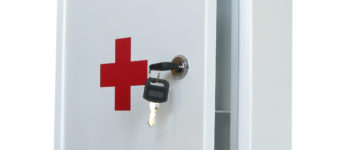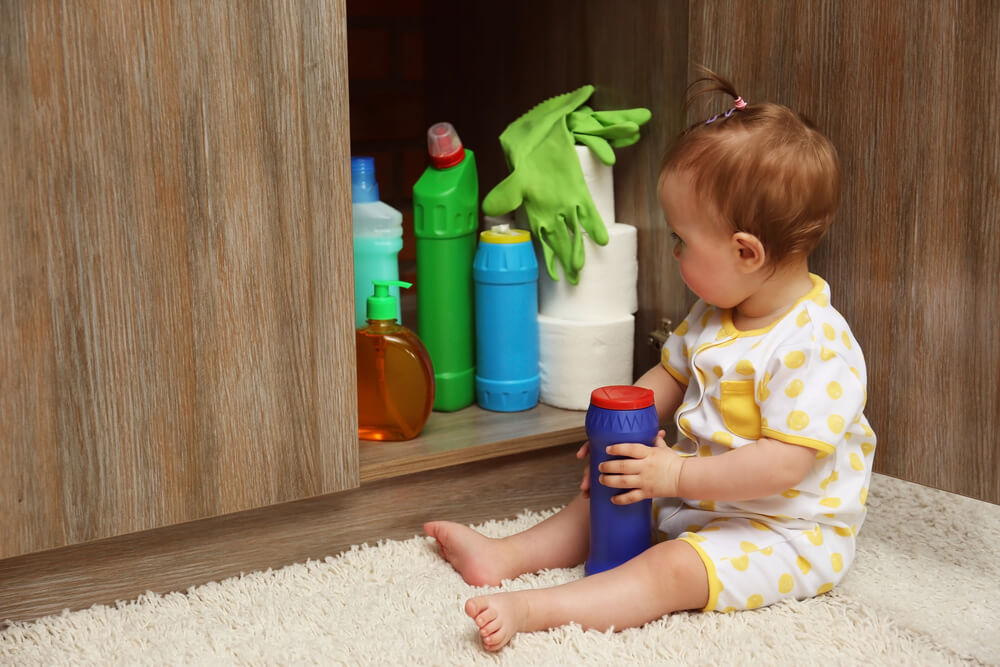Many things in our homes put young children at risk of poisoning. Medications, cleaning products, personal care products and some household plants can all be poisonous to a young child. Even a small amount can make your child very sick. To a child, some common household products can look like candy, juice or chewing gum.
Parents should go through every room to check for poisons.
Note: Other videos may be recommended by the host channel (e.g. YouTube, Vimeo). These suggestions may be based on your personal search history and other factors. The Manitoba Government does not control these suggestions and is not responsible for and may not endorse the content.
Keep all potential poisons locked up high, out of sight and out of reach
As your child grows, they become more active and can more easily reach and open cabinets.
Make your home a poison-safe zone by storing all potential poisons in a high-up cabinet, drawer or cupboard that can be locked using a lock (with the key stored in a hidden location) or with a latch that cannot be opened by a child.
Store products in their original containers and teach older children hazard symbols on containers.
Medications
Tips to prevent poisoning from medications:

Store medications “out of sight and locked up tight” so that children do not have access to them. The best choice is a locked box kept out of your child’s reach.
Lock up medications with child resistant caps as well, as some children can take the caps off.
It is best to use the original, labelled container that makes it clear what is inside and has the dosage information you may need.
Do not call medicine or vitamins candy.
Be extra careful with medicines that may taste good to your child, such as chewable vitamins and fruit-flavoured syrups. Children learn by touching, tasting and by imitating others.
When giving your child medicine, check the label to make sure you are giving the correct amount.
Keep products in their original containers to help you remember the medication and the dosage.
Keep visitors’ purses and bags out of your child’s reach as they may have poisonous products in them.
Visitors may have potentially poisonous products with them, such as medication, vitamins, cosmetics or cannabis products.
Other products that cause poisoning
- vitamins
- household cleaners and other chemicals, such as bleach
- laundry detergent, including single-dose pods.
- Laundry pods can look like candy and appeal to children, but they can cause burns and illness. It is safest to use powdered or liquid detergents.
- personal care products, such as mouthwash or nail polish, nail polish remover, perfumes, and aftershaves
- car supplies, such as antifreeze and windshield washer fluid
- alcohol
- nicotine (cigarettes) and vape juice (the liquid used in e-cigarettes)
- cannabis, including cannabis edibles that may look like a harmless snack to your child
- illicit drugs, such as opioids
- pesticides
- certain plants, such as mistletoe, holly berries and poinsettias
Tips to prevent plant poisoning
While children benefit from outdoor play and learning about how plants grow, some can be poisonous if eaten or cause irritation if touched.
- Know all plants in and around your home and yard.
- Label each plant in your home with the specific name (e.g., Devil’s ivy vs. just ivy).
- Keep all houseplants, seeds and bulbs out of reach of children.
- Teach children to never put leaves, flowers, seeds, nuts, wild mushrooms or berries in their mouths without first checking with an adult.
Did you know?
Poison centres across Canada received more than 200,000 calls in 2023, and 66,000 calls were related to children under six.
It’s a good idea to keep the number of your poison centre nearby or in your phone. Program the number into your phone’s contact list or keep it in a visible location, such as on your fridge.
If you think that your child may have swallowed something poisonous
- Stay calm
- Call the Manitoba Poison Centre – 1-855-776-4766
- In the event your child or someone else in your household is potentially poisoned, contact the Manitoba Poison Centre. If the person loses consciousness or has difficulty breathing, call 911.
If your child is awake and alert, call the Manitoba Poison Centre at 1-855-776-4766. Emergency responders will want to know…
- your child’s age and weight
- what was swallowed (show them the container of medication or poison if possible)
- when the poison was swallowed
- the address where the poisoning happened
Related links



